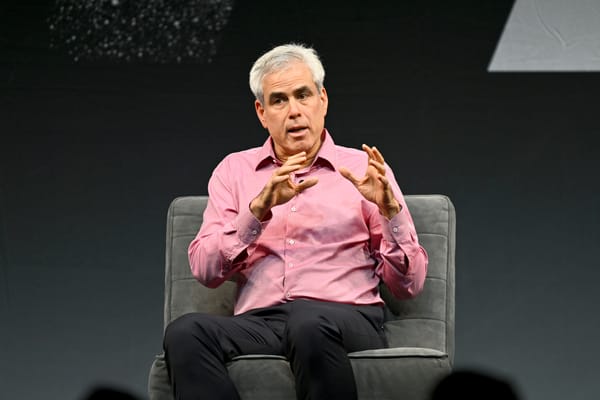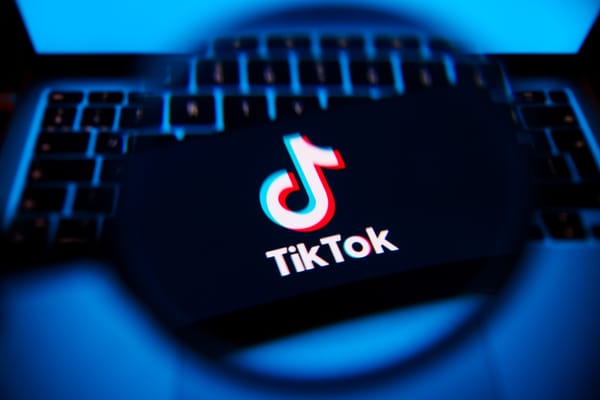How Axie Infinity is turning gaming on its head
Players are making thousands of dollars a month battling Pokémon clones. Is this how crypto goes mainstream?

Last month I wrote about Loot, a viral social project like nothing I had seen before. What made it possible was the unique digital objects known as non-fungible tokens, or NFTs, which inspired the Loot community to go build an entire fictional universe around them from the bottom up. Today I want to talk about another big social experiment that NFTs have enabled, and the potentially profound consequences of the platform that is emerging as a result.
I realize that, for lots of you, talk of blockchain projects immediately triggers eye-rolling and tab closing. But as with Loot, today’s edition is about one of those unconventional startups that feels too interesting to ignore. Especially because, on the surface, it can look like little more than a cheap Pokémon clone.
The name of this thing is Axie Infinity, and it’s made by a Vietnam-based company named Sky Mavis. Last week it was in the news because, just five months after raising a $7.5 million round of Series A funding, Sky Mavis added an additional $152 million Series B led by Andreessen Horowitz. The company, which was founded in 2018, is now valued at $3 billion.
The fundraising isn’t the interesting part: in 2021, almost any crypto-branded project showing decent growth will find itself showered in venture capital. Axie is interesting because it’s using cryptocurrency to stand up a new kind of video game, one in which you can earn meaningful income just by playing. The game is surrounded by a community that holds a financial stake in Axie via the game’s two currencies, which they can use to influence its development.
In short, it’s a social network where all the participants are buying and selling goods with real money. We have a word for that, one that we would almost never apply to a web-based social network: an economy. And if Axie continues to grow at its current rate, that’s poised to have some fascinating implications.
“Axie is just the beginning,” said Arianna Simpson, a partner at Andreessen Horowitz who led the firm’s Axie investment. “Axie sort of created this model, but I think it's going to be extremely widely applied. … If I can play a game, and have an equivalent amount of fun, and also make money — well obviously I'd rather do that, right? And so I think Axie is really just defining a new category, and this mechanism, in my mind, is going to be baked into the coming generations of games.”
But let’s back up for a minute: what kind of game is Axie Infinity, exactly? In short, it’s Pokémon on the blockchain. (It’s not available in app stores; you either download Axie onto your desktop or sideload it onto your Android phone.) The game offers turn-based combat between teams of three cartoon monsters, known as Axies; each Axie has powers originating from their type (bug, bird, plant, etc.) and their various body parts.
Where it differs from Pokémon is that Axies are unique digital objects stored on its own blockchain; to create new ones, existing owners must “breed” them by spending currency earned within the game or purchased from an exchange. By winning battles in the game, or selling Axies to other players, owners can earn the game’s currencies. Those earnings can then be sold on the open market for real money, generating income for the players.
Dedicated players are now earning thousands of dollars a month playing Axie, and the platform has grown quickly, to 1.8 million users logged in to the platform in August.As Rest of World reported in August, this has proven particularly true in the Philippines, where 40 percent of today’s Axie players are based. The combination of existing low wages in the country and pandemic-related lockdowns has been a boon to Axie, as players have flocked to the game in search of economic opportunity. (The outlet interviewed one man who doubled his income selling feed by playing Axie, to $2,000 a month; a follow-up story explored how the country’s Bureau of Internal Revenue is now hounding players to pay their taxes.)
One stat that struck me: Sky Mavis says 25 percent of its players have never had a bank before, meaning their Axie wallets are the first financial services they’ve been able to access. Simpson told me that in some places in the Philippines, people are paying their rent with the game’s SLP token. That helps explain how Axie’s total trading volume now exceeds $2.4 billion.
I asked Aleksander Larsen, co-founder and chief operating officer of Sky Mavis, why he thought Axie had grown so much faster than other crypto projects. In short, he said, Axie nailed the financial incentives: they gave players a good monetary reason to play.
“The way crypto works is that you have something to gain by it, right?” he said. “I think that's really where it started. And then over the past couple of years, more and more people have have started to believe in our vision.”
The company also made smart technical decisions: for example, moving the game’s transactions to a dedicated “side chain” that enables the game to use the basic structure of Ethereum without processing transactions there, which can be slow and expensive.
The question is how much bigger Axie can get from here. While the economic incentives can be powerful, particularly in developing countries, there’s no getting around the fact that playing Axie today is onerous. The eight-step process described in the company’s online guide involves downloading not one but two crypto wallets; buying and depositing Ethereum onto the company’s own blockchain; and purchasing at least three Axies, among other tasks.
There are a lot of upfront costs: Rest of World estimates that it currently costs around $1,500 to buy into the game. (I haven’t yet made the leap myself.) In the Philippines, companies are now loaning out Axies to other players in exchange for 30 percent of their earnings.
Larsen is the first to admit that the current setup is complicated. He likened it to “swimming out to an island” just to play.
“Axie is totally isolated out there — you have to do all this hard stuff to get there,” he said. “And yet people are willing to do that.”
But a change is coming, he told me. The company is currently at work on a free-to-play version of Axie that, at least theoretically, could pass muster in the Google Play Store or Apple’s App Store.
It should be available within three or four months, Larsen said. He said he was hopeful that the growing popularity of the app would give Sky Mavis leverage with Apple as it navigates app store policies. To date, so far as I can tell, there’s no iOS app for buying and selling NFTs. (Some, like OpenSea’s, simply least showcase the ones you own.)
The dream is to eliminate everything that’s hard about playing Axie and welcome in the rest of the world. Larsen hopes that in a future version of the game, you’ll be able to acquire your blockchain assets with a single click and start playing.
“That's the dream, obviously,” he said. “That's what I'm working for. And when that moment in time hits, I think we can get to 2 billion people.”
In the meantime, Axie is developing a way for people to buy virtual plots of lands in its fictional setting, the aptly named Lunacia, and eventually hopes to become a platform for games and experiences akin to Roblox.
But let’s fast-forward a few years to a point when Apple and the crypto companies have worked something out. What will it mean to live in a world where average people can make a little money — or even a lot of money — playing games? How will it affect what kinds of games get built? Will it gradually siphon the attention of people who might have otherwise spent their time thumbing through feeds, mindlessly enriching the platform?
It’s too soon to say, of course, but sometime this summer, these questions stopped feeling like sci-fi to me. I don’t know whether Axie Infinity is the next Fortnite. But I do believe that the phenomenon playing out in the Philippines today will be coming to other countries — possibly even more developed countries — in the not too distant future.
And when it arrives, the idea of playing to earn might bring a lot of people into crypto along with it.
Leftover questions: How can a free, App Store version of Axie possibly connect to the blockchain version? Will Axie-like games usher in a “gamer middle class” — something in between the console players making nothing and the e-sports pros? What will be the next set of applications to introduce these economies after games?
Jobs Board?
Hey, give me some feedback on something. Recently I’ve been exploring the idea of hosting a jobs board, both on the web and in the newsletter, for the Platformer community. The idea would be to create a spot for people looking for opportunities in platforms, particularly in roles related to policy and public safety. Companies could pay to advertise, and the money would support the publication. I’d use a third-party company to manage the listings, and would generally try to distance myself from the business aspects as much as possible. But I would also have to update my ethics policy to specify that, for example, I didn’t allow paid job listings to affect editorial coverage.
I’ve been getting feedback from readers in Sidechannel, but I’d like yours too. Would something like this be useful to you? What would make it better? Or do you hate the idea? Reply to this email if you have feelings.
Governing
⭐ Frances Haugen’s allegations don’t look like a typical case for the Securities and Exchange Commission — but the agency will likely feel pressure to bring a case anyway. We’re firmly into Matt Levine “everything is securities fraud” territory here. Here’s Dave Michaels at the Wall Street Journal:
Any securities-enforcement action would likely focus on whether the company or its executives told investors one story about known business risks or trends, while concealing worse news that they shared only internally. Any misleading statements would have to be material, meaning they could be expected to influence a trading decision or a vote on a corporate proxy ballot.
The issues cited by Ms. Haugen in her allegations may be material in the eyes of regulators, but they aren’t all traditional securities-fraud claims, according to lawyers. In one whistleblower tip provided to the SEC, Ms. Haugen and her lawyers wrote that Facebook made “multiple material misstatements and omissions on the question of whether Facebook and Instagram impact teenage users,” according to a copy seen by the Journal.
A look at the practical limitations of regulating big tech algorithms. “Every time a court has looked at an attempt to limit the distribution of particular kinds of speech, they’ve said, ‘This is exactly the same as if we had banned that speech outright. We recognize no distinction,’ ” says Daphne Keller. (Will Oremus / Washington Post)
Related: Parents of teens with eating disorders talk about their daughters’ struggles with Instagram. “Of course Instagram does not cause eating disorders,” one mother says here. “These are complex illnesses caused by a combination of genetics, neurobiology and other factors. But it helps to trigger them and keeps teens trapped in this completely toxic culture.” (Kari Paul / Guardian)
A former Apple employee filed two new complaints with the National Labor Relations Board alleging illegal interference with workers’ rights. Ashley Gjovik alleges that company policies against discussing workplace issues violate the law. (Josh Eidelson / Bloomberg)
An open letter signed by 90 Googlers and 300 Amazonians called on their companies to end work with the Israeli military. They’re concerned about their companies’ work for Project Nimbus, a $1.2 billion contract to provide cloud services for Israel’s military and government.
A draft proposal from the European Commission would greatly expand the self-reporting requirements around political ads for big tech platforms. “Buyers will also have to open up about the criteria used for targeting users such as their ages, gender, interests, and the time period when the ad was shown.” (Clothilde Goujard and Mark Scott / Politico)
The NFT trading platform Sorare is under investigation by the U.K. Gambling Commission, which believes that buying licensed digital soccer cards on the platform may constitute a form of regulated speculation. “Buying art is gambling” feels a bit extreme to me, but we’ll see. (Eli Tan / Coindesk)
Facebook removed two networks of coordinated inauthentic behavior in Sudan and Iran. In both cases, networks appeared to be linked to military groups supported by the government. (Facebook)
Despite mounting fears in the United States, China has demonstrated less leadership in artificial intelligence than the conventional wisdom would have it, this piece argues. China excels at machine vision, which is ideal for building a surveillance state but lacks other practical uses, the author says. (Tim Culpan / Bloomberg)
China’s anti-monopoly division plans to more than double its staff, to 100 people. Which monopolies are even left in China at this point?? (Pei Li and Coco Liu / Bloomberg)
Industry
⭐ Coinbase plans to introduce NFT trading on its platform in the coming months. You’ll be able to buy, sell, and showcase Ethereum-based objects on the service. Here’s Eli Tan at Coindesk:
OpenSea has seen remarkable usage during the NFT market’s red-hot run in the past four months, completing as many as 80,000 transactions per day at its peak. For some, however, the experience of navigating a browser-based crypto wallet remains a challenge.
“If you’ve tried to create or purchase an NFT, you’ve probably found the user experience lacking,” Coinbase said in a blog post. “Coinbase NFT will make minting, purchasing, showcasing and discovering NFTs easier than ever. We’re making NFTs more accessible by building intuitive interfaces that put the complexity behind the scenes.”
A look at how Slack has remade office culture, often to the horror of people running the office. Among the unanticipated issues: the rise of “side Slacks” — free alternate workspaces that employees launch to discuss office issues more freely. (Ellen Cushing / The Atlantic)
Tech platforms generally don’t share resources when it comes to identifying misinformation, meaning that much of their work is duplicated. This has pros and cons, of course. Fun fact: YouTube’s policy and enforcement leadership is codenamed Roomba. (Mark Bergen / Bloomberg)
Twitter added a tool to remove followers without notifying them, a feature sometimes called “soft blocking.” Personally I would never remove any of you as followers … you simply mean too much to me. (Kris Holt / Engadget)
Instagram is testing outage notifications. I imagine the company would prefer that these were not necessary at all, but given last week’s track record it does seem worth exploring. (Karissa Bell / Engadget)
Facebook is changing the way it measures daily active people by no longer automatically linking accounts created by one person across its family of apps. The moves come ahead of anticipated regulatory changes, the company said. (Kurt Wagner / Bloomberg)
Those good tweets
well well well if it isn’t the personality that my birth control pills have been suppressing for 13 years
— Kelly Bachman (@bellykachman) 8:09 PM ∙ Oct 10, 2021
why are all the available alarm sounds on a phone either "circus music played by children" or "what if enya was the cops"
— localghost:5984 (@mountain_ghosts) 4:05 PM ∙ Oct 8, 2021
I texted my best friend to be like “holy shit a girl we went to elementary school with is having a baby” and then I realized that we are 26
— sloane (sîpihkopiyesîs) (@cottoncandaddy) 9:31 PM ∙ Oct 10, 2021
Hulu execs: “We’ll call it Huluween! It fits, it flows, everyone gets what it is right away.”
— rachel kiley (@rachelkiley) 5:37 PM ∙ Oct 11, 2021
Meanwhile, at Peacock:
Talk to me
Send me tips, comments, questions, and rare Axies: casey@platformer.news.





